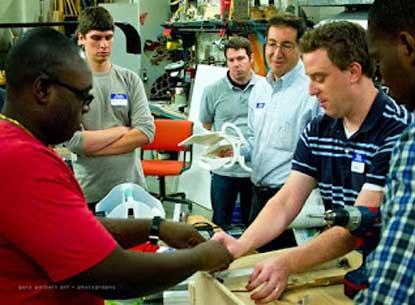
Sept. 27, 2012
Landmark Product Innovation Program Starts Classes
Share this story
The da Vinci Center for Innovation at Virginia Commonwealth University is offering the nation’s very first Master of Product Innovation (MPI) program. The graduate program, which started this semester with 10 students in its inaugural class, blends three different disciplines for a unique interdisciplinary experience.
“The program is a celebration of the arts, engineering and business principles,” said Kenneth Kahn, Ph.D., professor of marketing in the VCU School of Business and director of the da Vinci Center. “Students focus on the development of a product from which users – consumers – can benefit. Not only do the students work across disciplines, the faculty also work together to form this interdisciplinary program.”
Students begin the program prior to the first day of class when they participate in a three-day product innovation boot camp. Each day focuses on one of the three disciplines with students visiting museums and local companies in Richmond.
“The intent of the boot camp mirrors the regular courses in that learning is not necessarily taking place in the classrooms, but all around the city. The program is a great example of experiential, hands-on learning,” Kahn said.
Faculty members in the arts, engineering and business have worked together to create a program that provides a cross-functional experience for students.
“Overall, the MPI program is designed to expose students to product development best practices and to provide the opportunity for hands-on application of procedures, tools and techniques for successful innovation covering many diverse situations,” said Frank Franzak, Ph.D., associate professor in the VCU Department of Marketing. “Supporting da Vinci programs is supporting the future. Whether one does this as a faculty member providing time, knowledge and insights, or as a company providing problems, experiences and funding, it feels good to be involved in making the future a better place.”
During the first semester of the two-year graduate program, students take courses in each discipline as well as an integrated design studio class, working on a self-directed project. In the second semester, students work on a project with a more corporate-like directive. They’ll learn how to be on a team and communicate with those from different disciplines within the same company.
“The combination of a cross-discipline approach to learning really appealed to me,” said Gary Garbett, an MPI student. “Real life and certainly the workplace environment each operate with the same flair of cross disciplines, cultures and methodologies rather than a one-way funneled approach to thinking and problem solving.”
When the students enter the program’s second year, they work on their master’s project by creating a proposal for a product innovation and then developing a prototype of the product.
“I am very interested in product development,” said Olugbenga Oredein, a student in the MPI inaugural class. “As a mechanical engineering undergraduate, I did not receive much practical experience in product development until my senior year. I fell in love with it, but had no way to gain employment in the field and no basic training on how to pursue products as an entrepreneur. I really like the way the MPI program is structured,”
Students can take classes on a full or part-time schedule, and with night classes, the program is designed for those who are already professionals in the workforce.
Graduates from this program will be able to plan, apply and execute product innovation skills for developing and launching new products and services as well as serve as an interface between different departments and disciplines within an organization.
“Students graduating from this program are being taught methods in problem solving, and more importantly, problem identifying,” said Sterling Hundley, associate professor in the Department of Communication Arts in the VCU School of the Arts. “The ability to approach their lives and careers as entrepreneurs will always yield better results, including within the structure of a corporation.”
With a background in the arts, engineering and business, MPI students will be able to translate opportunities into product specifications, commercial concepts and eventual new product introductions.
“When the students graduate, they will be prepared to fill the role of a product manager or become product development team leaders,” Kahn said. “They will be wired to help companies think differently and know how to drive innovation within a company. They will have the ability to bring together all facets of product innovation, from the art, business and engineering perspectives. The program’s motto, ‘Come in with a business problem, leave with a business solution,’ applies to both those students wishing to work in the corporate world or start their own ventures. As they graduate, students will be able to make it real.”
An original collaboration of the schools of the Arts, Business and Engineering, the VCU da Vinci Center is a unique collegiate model that advances interdisciplinary innovation and technology-based entrepreneurship. In addition to the current collaboration, the College of Humanities and Sciences will be joining the center later this semester.
For more information about the da Vinci Center and the master’s program, visit http://www.davincicenter.vcu.edu/. Application deadline for the fall 2013 semester is May 31.
Subscribe to the weekly VCU News email newsletter at http://wp.vcu.edu/vcunews/ and receive a selection of stories, videos, photos, news clips and event listings in your inbox every Thursday.
Subscribe to VCU News
Subscribe to VCU News at newsletter.vcu.edu and receive a selection of stories, videos, photos, news clips and event listings in your inbox.










